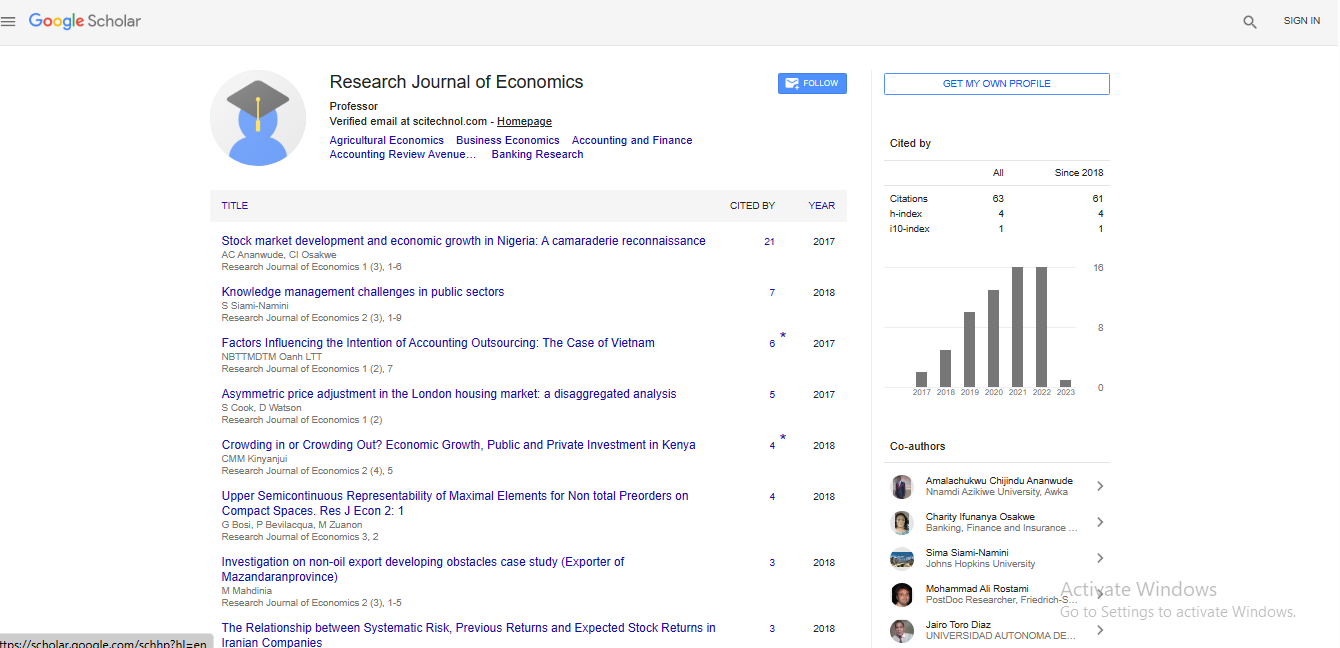Commentary, Res J Econ Vol: 7 Issue: 3
The Role of Econometrics in Bridging Economics and Statistics
Zhican Xu*
Department of Economics, Huazhong University of Science and Technology, Wuhan, China
*Corresponding Author: Zhican Xu
Department of Economics
Huazhong University of Science and Technology
Wuhan, China
E-mail: xucan@zhi.cn
Received date: 28 April, 2023, Manuscript No. RJE-23-102323;
Editor assigned date: 02 May, 2023, Pre QC No. RJE-23-102323 (PQ);
Reviewed date: 16 May, 2023, QC No. RJE-23-102323;
Revised date: 23 May, 2023, Manuscript No: RJE-23-102323 (R);
Published date: 30 May, 2023, DOI: 10.4172/RJE.1000149
Citation: Xu Z (2023) The Role of Econometrics in Bridging Economics and Statistics. Res J Econ 7:3.
Description
Econometrics is the field that combines economic concept and statistical analysis to study and quantify relationships between economic variables. It provides a powerful framework for generous and modeling complex economic development. This study discusses about the world of econometrics, its methods, and its role in improving economic analysis.
Economics, mathematics, and statistical inference are all used in econometrics to quantify economic processes. In other words, it transforms theoretical economic models into practical instruments for determining economic policy. The goal of econometrics is to transform qualitative assertions into quantitative ones, such as "consumption expenditure increases by 95 cents for every dollar increase in expendable income" or "the relationship between two or more variables is positive".
Defining econometrics
Econometrics is the application of statistical methods to economic data to test and estimate economic theories and economic relationships. The purpose is to provide empirical evidence to support economic hypotheses. Econometricians use mathematical and statistical tools to quantify the impact of various factors on economic performance and to predict future behavior.
Economic theory and empirical analysis
Economic theories often provide valuable insight into how the economy works, but testing these theories requires empirical analysis. Econometrics fills this gap by providing a systematic approach to testing economic theories against real-world data. Combining economic theory and statistical models allows economists to assess causal relationships between variables and identify factors that drive economic phenomena.
Statistical tools in econometrics
Econometrics relies on a wide range of statistical methods to analyze economic evidence. These techniques include regression analysis, time series analysis, panel data investigation, and simultaneous equation modeling. Specifically, regression analysis is a fundamental tool in econometrics, compliant researchers to estimate the relationship between a vulnerable variable and one or more independent variables.
Causal inference and identification
One of the biggest challenges in econometrics is establishing causality. Economists often try to understand how changes in one variable affect another. However, correlation does not imply causation, and econometrics uses different methods to deal with this problem. Instrumented variables, natural experiments, and Randomized Controlled Trials (RCTs) are some of the techniques used to establish causality and identify the effects of specific factors.
Forecasting and policy analysis
Econometrics plays an important role in predicting future economic trends and assessing the impact of policy changes. Time series analysis and econometric models allow economists to make forecasts based on historical data and to estimate the likely consequences of political intervention. This allows policy makers to design effective strategies and anticipate the likely consequences of their decisions.
Economic policy evaluation
Econometrics also plays an important role in evaluating the effectiveness of economic policies. By analyzing the impact of policy changes on relevant economic variables, economists can measure policy success and identify unintended consequences. These empirical insights help policymakers refine their strategies and make more informed decisions.
Challenges and limitations
Econometrics offers valuable insights, but it is not without challenges and limitations. Economic data can be subject to measurement error, bias from omitted variables, endogeneity, and other issues that affect the accuracy of results. Moreover, establishing causality in complex economic systems can be difficult, as multiple factors often play a role. Economists must carefully address these challenges through robust modeling techniques and rigorous data analysis.
 Spanish
Spanish  Chinese
Chinese  Russian
Russian  German
German  French
French  Japanese
Japanese  Portuguese
Portuguese  Hindi
Hindi 